|
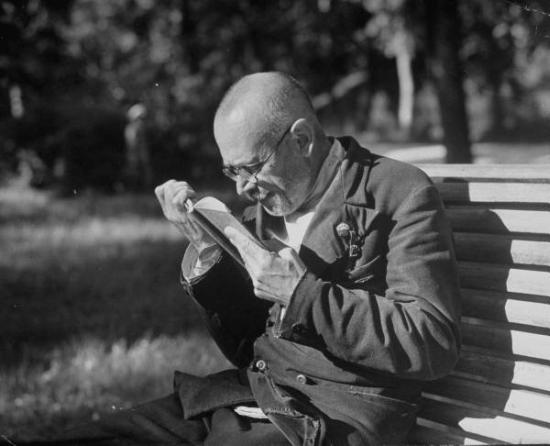
Kislovodsk
1941
Margaret Bourke-White - Soviet Union
Weimar
_______________________
Three Poems
Charles Bernstein
Loneliness In Linden
—After Wallace Stevens
The fear and the hum are one.
Monuments of show gumming the works
Until the weather grows tired of the people
And the people grow tired of the dance.
Jamais, jamais, jamais, again.
The measure of the town against a dampening sky
Cobbling together six million tunes
Into more than the tones tattoo
Or their scrambled mosaic forecloses.
And if the fume and the hope
Are one? My monkey, from ’49
Steps as silent as those songs
Along the cratered dark
Where Jews do Jewish things
No one pretends to understand
Or are they pilgrims on this night
When the fear and the hum are one?
...(more) _______________________
Sand Boils
Struan Gray
(....)
... In written poetry, close reading and an informed, receptive mind are often needed to appreciate suggested references and ambiguities that are otherwise easily dismissed as vagueness or verbal tics, but one great advantage of the visual is that an equally multifaceted photograph can be assimilated quickly and intuitively. There is no need to instruct when showing will suffice, and photography can gently imply multiple meanings without having to strive to establish an impression of authority.
This sort of poetics is common in photographs of people, but it is rare in landscapes. Rare, at least, in landscapes made in the last fifty to sixty years, since the sixties sneered off the deadly serious post-war last gasp of modernism. Contemporary photographers will establish tension between their landscapes and their titles, or with concepts expressed in an accompanying essay, but they shy away from putting that tension into the work itself. It is usually easy to tell what we are looking at: the important question is why it is being shown to us, and the answers are given outside the frame in the form of context, venue and reputation.
This is a shame because it locks shut an entire cabinet of photographic tools, and because it reminds us of the role of shabby fashion in determining the favoured art of the moment. Also, I personally fret that when MOMA calls at the apogee of my creative endeavours all I shall have to show them are photographs taken in a supposedly obsolete mode of expression....(more)
_______________________

Margaret Bourke-White
b.
June 14, 1904
_______________________
Special Issue
Undoing a Century of Reform: The Great Reversal in American Politics
Logos
2011: vol. 10, issue 2
Farewell to Democracy?
Philip Green
... Capital’s class war knows no boundaries. Nor can labor’s domestic regimes offer it much protection even if they so desired, as the requirements of the international capitalist class, enforced by institutions such as the World Bank and the I.M.F., are sharply at odds with the traditional modes of state protection or regulation. In this situation, then, the working class–any working class–is disposable; and the political parties that it once identified with are all either dead or dying. In the United States, e.g., where the role of wealth is much more transparent than in most European economies, this year corporate donations flow to the G.O.P., whereas two years ago they flowed to the Democrats. But it’s the same money from the same sources doing the same job of ensuring support for their comparative position–but most definitely not that of their workers–in a hyper-competitive world. Even the debate over “out-sourcing” has become irrelevant, as capital relocates itself to wherever labor is most exploitable.
Moreover, the nature of representative oligarchy today is such that policy differences have narrowed almost to the point of non-existence; or where they do exist, as in say the field of financial re-regulation, the economic power of the sector that is supposed to be regulated ensures that no Party will really do that job, or even discuss how it might be done best. Everyone knows this; and everyone who pays attention also knows the material outcome of the inequality squeeze. Put simply, the wealthy won’t pay for public goods or collective welfare, and the declining middle class can’t. (....)
The American polity is foundering in a perfect anti-democratic storm created by, in combination, a depth of inequality that appears unyielding to any prescription and that is maintained by a sclerotic political system; a state that can be mobilized only for self-destructive imperial adventures; a dangerously irrational subset of the citizenry fed toxic propaganda by an hypertrophied mass media; and a financial plutocracy that seems to have outreached all possibilities of containment. If this tendency continues, democracy will become less a contested terrain and more a land of myth and legend....(more)
_______________________
Unanswered Plea
Aleš Debeljak
Translated from Slovenian by Andrew Zawacki and by Aleš Debeljak
words without borders
I learn things by myself, which is why
it takes so long. I'm asking you
to be patient. That's not asking much.
I learn by myself, learn to cross the village,
it's not every day I recognize you
in the timberwork of the roof,
the builders' sweat alight in the air even now.
The river is sluggish here, the lake is asleep,
one's step less heavy, but I'm no longer
convinced I've read it right: instructions
for painting a woodpecker's wings in red
and black and red, and how to cast a spell upon
the ankles of a pregnant girl. I don't know
nor want to know her name, and maybe that's
the reason I can't breathe, but I won't forget
the way she makes me feel. Did I really
read it right? Okay, I accept these signposts
in the humid moss, in the backbone curving
throughout every season, in scarlet shells
cracked apart at the feast to which I'm called.
Yes, this I accept. But where in the language
should I look for you, when the language
is unworthy of what you are? It might be
that you assume a common form, such as love,
or maybe you're something awful down the road
that will, after all, come to pass.
Biography of Sleep
Aleš Debeljak
Translated from the Slovenian by Brian Henry
Reluctant Modernity: the institution of art and its historical forms
Aleš Debeljak google books
Without Anesthesia
Aleš Debeljak
Translation by Brian Henry
blackbird
3
It is time. Say what was once already said.
So that there will be no misunderstanding. Begin
where you want. More than now you won’t tolerate.
In a bird’s takeoff from the water’s surface, there’s
already a fall. You too will lose nothing. You keep
as much as you give. Fleeing in a foreign tongue
is longing for silence. Whose bodies do not fray,
because you know them from the inside.
Because only people die, not their silence.
But flocks of starlings returning home are loud.
You’ll have to raise your voice. Speak now! Say
how you keep quiet and become the breath of all people.
4
Enough words. Better to doze off. Above me wild geese,
dry cough and embers in me. —A gust of wind spins
the weathervane. In the end I stayed. Really it is already
time that I become the acoustics of silence, a secret
ongoing dialogue. I won’t be anybody’s cry anymore,
crystallized in amber. The stars are cold, people
turn on lights in flats. Night’s ultrasound goes across
the world. What can I still expect, what can I still give?
I remembered the rhythm of physical pain with which
the world begins every day. I know the illusion of images
and old texts, I would like to be alone again.
Like the baby crying when separated from his mother.
...(more)
Interview with Aleš DebeljakThe Balkans Project
.....................................................
Andrew Zawacki: On Slovenia, Antitranslation, and “One-night Stand” Poems
guernica
Guernica: In your introduction to Without Anesthesia, you argue that, “Totalitarianism has assumed myriad guises, including that of democracy, but Debeljak has refused to let poetry cooperate.” Does that make his work political?
Andrew Zawacki: In part, yes, depending on what we mean by “political,” of course. Coming from a country of only two million people, who speak a language known in few places outside Slovenia and whose culture is regrettably off the map to most Europeans, Debeljak has been only a tentative apologist for globalization. He is an inveterate cosmopolite, ardent about the value of any knowledge and experience that transgresses national boundaries, linguistic limits, literary affinities, personal comfort zones. But when it comes to those structures of power that have exhibited the potential to flatten the global terrain into a unified, homogenous plane—the state, or the nation-states coalescing around the EU or NATO, or else the Church, hegemonic Western “soft power,” third-stage capitalism tout court—, he’s not always so enthusiastic. This may make Debeljak’s work “political,” though I would say more broadly that it reveals him to be an appropriately skeptical, alert, engaged human being, period.
It seems to me that being a Slovenian writer more or less demands that one be “political” in this sense. A writer working within a ’minor literature’ must be aware of the conditions under which she works. Simply put, she has more to lose, and she may well lose it precisely by appearing to “gain” in American eyes. For all Debeljak’s muscular embracing of translation, he ought also to be considered in terms of what Nathaniel Tarn has labeled “Antitranslation.” There’s an important vector to Debeljak’s thought and practice that entails, as Tarn puts it, the warning “don’t tread on me,” an imperative to not be “translated” into the categories of Marxism or Coca-Cola economics, say, or some Benetton brand of unity or any other -ism endemic to anywhere other than Slovenia.
On the most obvious level of “politics,” where the content, stance, or argumentative style of the writing is pitched toward responding to actual events, I believe Debeljak has been pretty clear: emerging in the 80s, his generation determined that it would not have its agenda set for it, at the very moment that kneejerk aesthetics of overt resistance and card-carrying “engaged” art was indeed setting artistic agendas. The sense of refusing to write a poésie engagée because it requires the outright refusal of existing social and political paradigms—that’s something dear to Debeljak, too. Not to mention his unwillingness to be a pawn in that old American vetting game—reinvigorated as a marketing ploy, of course—of elevating “dissident” writers who spent time in prison for their recalcitrant beliefs and so on. ...(more)
_______________________
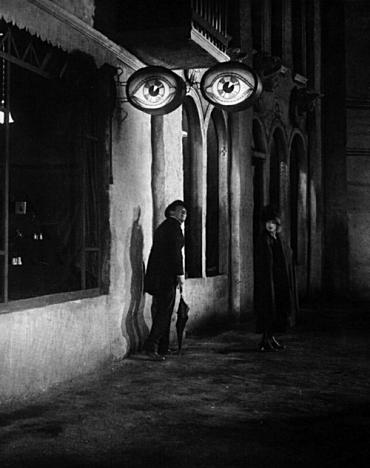
Karl Grune
The Man With the Hat
Weimar
_______________________
from
Storm, lustral
Unevensong
Andrew Zawacki
conjunctions
(....)
Although it is neither your
language nor mine, not
in the eyebright & not in
your name, no matter if
driftwood if pollen or cirrus
hauling their muted shadows
vex the dune: although every
written must
other its author,
a daybreak sonata, horizon
chateau, the private archives
of lakewind & loss, a claret tide
that’s closer to me than my
self: although wet japonica
as if by default, melissa or
ambergris, coltsfoot or burr
inhabiting
a single stroke of
sun: give & forgive us
our tagalonglight
our fjords of crashing
through thaws of ourselves,
anglesea & veer from an arsenic
sky, like a child who guards
a sand castle against
the afternoon,
tapping a wrinkle
of salt water,
telling the ocean to stop
...(more)
Andrew Zawacki at PennSound
_______________________
The Dream of Constantine
Tom Clark
To Constantine in the constant cańon of his morbid discontent
Vision distorted by the acridity of some mysterious potion
Guarded conspiracies in the family, rebellion bruited, haystacks aflame at the borders
The latest hue and cry from the provinces fading into the din of background noise
The breakdown of communications with the common people,
The haze of stars, the tingle, the flame, the wincing shame of the general decay
Across the great breadth of the subject lands, not in his imperial tent alone --
Or again, later, the epidemic of lamentation about the way life was lived now --
The disputes among the wizards, the coins thrown down upon the marble tiles,
The relentless advance of barbarian industry at the exposed frontiers,
The news that the knights sent out to explore the ruins had not been heard from,
That shadows were lengthening across the paved courtyard, even as day was expected to
Be coming on -- the troublous murmurings, the brazen trumpeting from the stables --
To the good ruler once seen banging his tankard in high revelry, all woes forgotten,
At the jolly reunion, none of this would have needed to be explained --
...(more)
_______________________
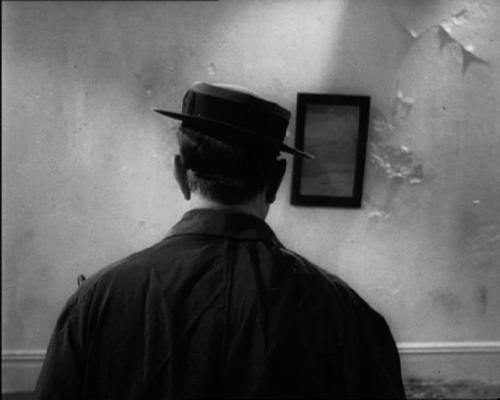
Buster Keaton
"Film"
Samuel Beckett
youtube
_______________________
Festival of the Trees - 60
hosted by Brenda Clews at Rubies in Crystal
This month I had asked us to record an engagement with a tree or trees, preferably in video, but any form. To talk to the trees and bring back what transpired. This communing I knew would reflect us back to ourselves as we projected our way of seeing things onto the arborescent consciousness, and so that self-consciousness was part of it, seeing how we shape what we see. I also knew that what I was asking was a type of vision quest. For you to seek out the tree of your dream consciousness, the tree that is singing to you, or to tell us about a vision that involved communion with a tree. All this assumes a deep connection to trees, to an ancient archetypal forest wisdom that we are likely born with.

Suginami
James Luckett
Walks through Suginami
Sheila Newbery
The mind at work in Suginami — in booming Tokyo — seeks no souls: instead, it puzzles out patterns, lines, shapes as adroitly as a miraculous cat, who takes the viewer by the hand and says, let me show you a thing or two. The creature is an alley-dwelling virtuoso — at once playful yet deadly serious, there being no essential contradiction between these two aspects of his nature. We follow him through the byways of the city, tracing the visible resonance of the city’s thronging, unseen human presence.
But also there’s this — another way to describe why I like Suginami: what if you watched someone working a Rubik’s Cube with complete ease and fluidity (one of those wunderkinder), and the cube somehow became not merely a puzzle with a distinct solution (an aesthetic stopping point), but a beautiful, articulate thing with a language and rhythm of possibilities, previously unsuspected. Well, it’s something like that…...(more)
Stacy Oborn on Suginami
(....)
I think of two things about these photos when I look at and consider the images that make up Suginami: the first is of Luckett as the quintessential flāneur, someone who, in Charles Baudelaire's words, is, "a gentleman stroller of city streets," someone who, though a detached observer, plays a key role in understanding and portraying the city, a kind of "botanist of the sidewalk." The second is rather related to the first, but maybe a bit more spiritually leaning: still the sidewalk walker or stroller, but more in line with one that participates in walking meditations (which in Buddhist literature, one is instructed to, "Notice the beauty of your surroundings, both externally and internally. Smile with every cell in your body"), which is what I believe these walks eventually became....(more)
Suginami : the second edition + outtakesJames Luckett
consumptive
To commemorate the second edition I’m posting 32 photographs that didn’t make it into the finished edit. As the project came into focus, there was something in each of these images that didn’t quite mesh. Some are too tidy, others too messy, quite a few are too pretty, in several the composition is off, one is overexposed, and some felt too incongruous for inclusion, while others were just too similar. I’ll leave it to you to decipher which was rejected for whatever reason. Finally, there are some photographs presented above that were cut because they were simply too Japanesque. It was never my interest with Suginami to make exotic feeling images. My intention from the start was to make photographs of the neighborhood I called home....(more)
_______________________

photo - mw
_______________________
To a Child dancing in the Wind
DANCE there upon the shore;
What need have you to care
For wind or water’s roar?
And tumble out your hair
That the salt drops have wet;
Being young you have not known
The fool’s triumph, nor yet
Love lost as soon as won,
Nor the best labourer dead
And all the sheaves to bind.
What need have you to dread
The monstrous crying of wind?
II
Has no one said those daring
Kind eyes should be more learn’d?
Or warned you how despairing
The moths are when they are burned,
I could have warned you, but you are young,
So we speak a different tongue.
O you will take whatever’s offered
And dream that all the world’s a friend,
Suffer as your mother suffered,
Be as broken in the end.
But I am old and you are young,
And I speak a barbarous tongue.
Yeats, Responsibilities and Other Poems, 1916
_______________________
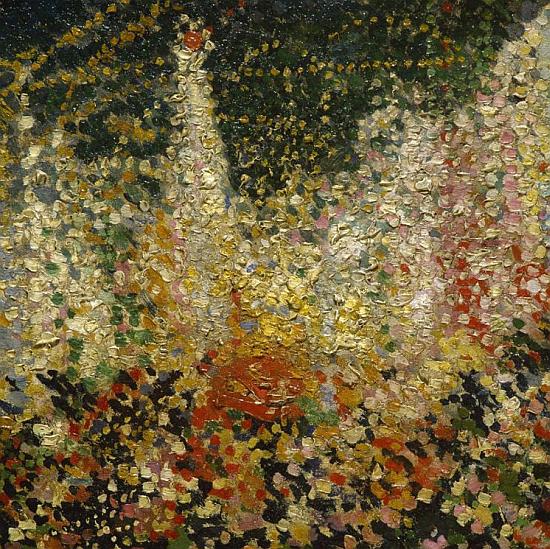
Study
"Battle Of Lights, Coney Island, Mardi Gras"
(1913)
detail
Joseph Stella
b. June 13, 1877
_______________________
Why Should Not Old Men Be Mad?
William Butler Yeats
b. June 13, 1865
WHY should not old men be mad?
Some have known a likely lad
That had a sound fly-fisher's wrist
Turn to a drunken journalist;
A girl that knew all Dante once
Live to bear children to a dunce;
A Helen of social welfare dream,
Climb on a wagonette to scream.
Some think it a matter of course that chance
Should starve good men and bad advance,
That if their neighbours figured plain,
As though upon a lighted screen,
No single story would they find
Of an unbroken happy mind,
A finish worthy of the start.
Young men know nothing of this sort,
Observant old men know it well;
And when they know what old books tell
And that no better can be had,
Know why an old man should be mad.
- from On The Boiler
_______________________
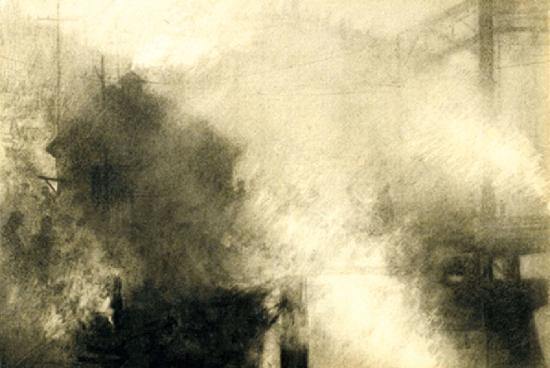
Morning Mist at the Mine Mouth
Joseph Stella
1908
_______________________
Oil And Blood
In tombs of gold and lapis lazuli
Bodies of holy men and women exude
Miraculous oil, odour of violet.
But under heavy loads of trampled clay
Lie bodies of the vampires full of blood;
Their shrouds are bloody and their lips are wet.
- William Butler Yeats, The Winding Stair and Other Poems, 1933
_______________________
Rimbaud's Wise Music
Lydia Davis reviews Ashbery's translation
nytbr
(....)
Besides his early absorption of Rimbaud’s work, Ashbery brings to this translation a long and deep familiarity with French life, language and culture, particularly artistic and literary culture, and the experience of having translated many other French works over the years — by Pierre Reverdy, Raymond Roussel, Max Jacob, Pierre Martory (as well as at least one detective novel, as the amusingly renamed Jonas Berry). These translations are part of a larger body of Ashbery’s work that has served to offer us — his largely monolingual Anglophone readership — access to poets of another culture, either foreign or earlier in time. (Notable, for instance, is his keenly investigatory, instructive and engrossing “Other Traditions,” the six Norton Lectures that open our eyes to the work of such luminaries as John Clare and Laura Riding.) In tandem, then, with his own 20-plus books of poetry (not to mention his teaching and his
critical writings on the visual arts), Ashbery has extended his generous explicating intelligence to the work of many others, most recently in “Illuminations.”
In a meticulously faithful yet nimbly inventive translation, Ashbery’s approach has been to stay close to the original, following the line of the sentence, retaining the order of ideas and images, reproducing even eccentric or inconsistent punctuation. He shifts away from the closest translation only where necessary, and there is plenty of room within this close adherence for vibrant and less obvious English word choices. One of the pleasures of the translation, for instance, is the concise, mildly archaic Anglo-Saxon vocabulary he occasionally deploys — “hued” for teinte and “clad” for revźtus, “chattels” for possessions — or a more particular or flavorful English for a more general or blander French: “lush” for riches, “hum of summer” for rumeur de l’été, “trembling” for mouvantes....(more)
_______________________
Among School Children
William Butler Yeats
(....)
VIII
Labour is blossoming or dancing where
The body is not bruised to pleasure soul.
Nor beauty born out of its own despair,
Nor blear-eyed wisdom out of midnight oil.
O chestnut-tree, great-rooted blossomer,
Are you the leaf, the blossom or the bole?
O body swayed to music, O brightening glance,
How can we know the dancer from the dance?
...(more)
_______________________
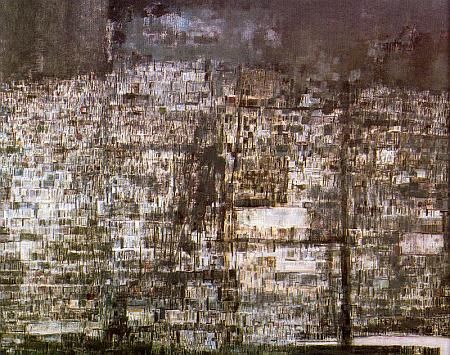
the magic mountain
1979
Maria Elena Vieira da Silva
b. June 13, 1908
_______________________
from The Nerve Meter
Antonin Artaud
I have aspired no further than the clockwork of the soul, I have transcribed only the pain of an abortive adjustment.
I am a total abyss. Those who believed me capable of a whole pain, a beautiful pain, a dense and fleshy anguish, an anguish which is a mixture of objects, an effervescent grinding of forces rather than a suspended point
—and yet with restless, uprooting impulses which come from the confrontation of my forces with these abysses of offered finality
(from the confrontation of forces of powerful size),
and there is nothing left but the voluminous abysses, the immobility, the cold—
in short, those who attributed to me more life, who thought me at an earlier stage in the fall of the self, who believed me immersed in a tormented noise, in a violent darkness with which I struggled
—are lost in the shadows of man.
...(more)
.....................................................
Analects On The Influence Of Artaud
How Sickness Is, And Isn’t, A Prerequisite For Poetry
Rick Moody
The Believer
(....)In those days: Genet and Derrida and Barthes and Foucault and Deleuze, as well as Artaud. Thus, the specific Artaud influence was a general French influence, and the general thrust of that French influence, as I understood it, included trusting in imagination as an anarchic force, the unstoppable force, a force in the midst of forestalling the attempts of society and metaphysics to control and organize. “Withdraw allegiance from the old categories of the Negative (law, limit, castration, lack, lacuna), which Western thought has so long held sacred as a form of power and an access to reality. Prefer what is positive and multiple, difference over uniformity, flows over unities, mobile arrangements over systems” (Foucault’s preface to L’Anti-Oedipe). I therefore loved the surrealist manifestos, too. I got bored only with the surrealists when the principals became too enamored with politics. Artaud got bored early, too. He turned on them with a vengeance. The spurned lover.
*
My hypothesis: Artaud is part of a European and specifically French intellectual lineage obsessed with the rigors of truth-telling. (“We are born, we live,” he said, speaking to a tradition of paradoxical truths, “we die in an environment of lies.”) Artaud aspires to be a magus of truth, a sorcerer of truth, and he is willing to die for it, or to be driven insane by his perceptions: “I believe that our present social state is iniquitous and should be destroyed. If this is a fact for the theater to be preoccupied with, it is even more a matter for machine guns.” Does he believe what he’s saying exactly as he’s saying it, or does he simply believe that the truth is in the avowal, which avowal changes its utterer, makes it nearly impossible for him to bring the message back to the place where it most needs to be brought—the place of mendacity?
“Should I be writing like Artaud? I am incapable of it,” Derrida says, “and besides, anyone who would try to write like him, under the pretext of writing toward him, would be even surer of missing him, would lose the slightest chance ever of meeting him in the ridiculous attempt of this mimetic distortion.”...(more)

Levitation
1915
Egon Schiele
b. June 12, 1890
_______________________
Mass Bible-Based Sexual Dysfunction as Root of Culture Wars?
Frank Schaeffer
(....)
From a child’s perspective peering out at the larger world from deep in the cocoon of a “Bible believing home,” every word of the Bible is understood to be true in ways that nothing else is or ever will be even if, years later, that child grows up and changes his or her mind. That former child’s grown-up incarnation may be willing to admit nuance and paradox, but the emotional “weight” of the absolutely true Word lingers. The actual words in the Word are still the very fabric of a whole private universe inhabiting those raised inside the hermetically sealed tunnel of absolutist faith, “truer” than all the other words he or she will ever hear, say, read, or think put together—truer than any later reasoned evidence. And on top of that the words of the Bible, or even a few notes of an old hymn, cast a shadow of bittersweet nostalgia that defies reason as thoroughly as a whiff of perfume reminds a man of his first lover and evokes a longing that cuts to the heart.
I used to think I’d someday sort out the difference between what I believe “for myself” and how I was conditioned to think. These days I don’t believe that clarity is possible. For one thing belief is a snapshot of just that day since beliefs change and we also change our minds. So instead I use the fundamentalist chains binding my brain as a point of creative departure, as the context that generates (as it were) letters from prison sent to the outside world....(more)
_______________________
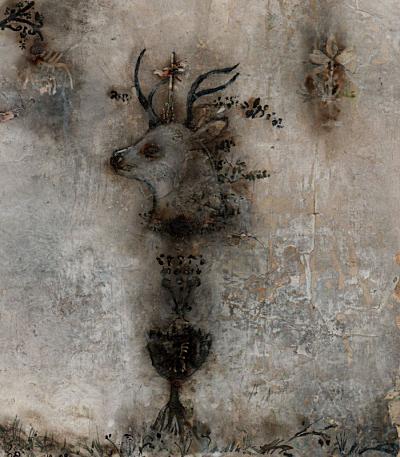
the sky still farther away
Herbert Pfostl
_______________________
Four Poems from Stücke
Romįn Antopolsky
translated by Michelle Gil-Montero
conjunctions
Hand on the wall my
time in turn to
mute—to form with
rhythm: my whole
hand on the wall my
shadow made into
five soft antlers
at rest. They are one
hand on the wall my
shadow and hand of a size
same; equal the time of
one being after
the other: with no interval—and
I see the
bosom that
gives a name to
its street:
the five fingers
squash the wall:
shadows not are seen
with hands alone. ...(more)
Romįn Antopolsky
_______________________

all things of this world
Herbert Pfostl
Herbert Pfostl's Paper Graveyard
_______________________
That
Tadeusz Peiper (1891-1969)
presented by James Luckett
That, that worlds inside my walls, that worlds will shriek inside my walls,
worlds of cities, of cities like a sea, a sea not of people but of stars,
a sea of song, a song straining the sky, straining it on syllables of pride,
through lights new as the springtime lit up by fashion,
and that I don’t see the hands to which I opened my doors
and that I don’t see the minds into which I lay my worlds
and that, and that, that I am not amongst you.
(....)
But, after all, I spoke so clearly that every pear could catch flame!
my sentences, which sometimes were as crooked as a carpenter’s thumbs,
since, when I crookedly seized the tree of matter, fruits, branches, and leaves found their way into my sentences too,
and every strump, touched by me, said as much as it meant.
But for you my act crumbled, like a nut crushed too hard,
but know: the faults in my work are most fragile
when they originate in you.
Your sky, not mine, shrouds me in dread.
To believe in my words, it’s enough for me to look at the clock,
to think, enough to defend myself,
but to act, I need cities in which a spark feeds on that fat of praise,
and where there are those who would dream what I dream like me.
So I regret
that I don’t see the minds for whom I opened a door
and that I don’t see the hands in which I lay my worlds
and that, and that, that from my dreams I won’t make our dreams,
I, I the mayor, I the mayor of homeless dreams.
...(more)
_______________________
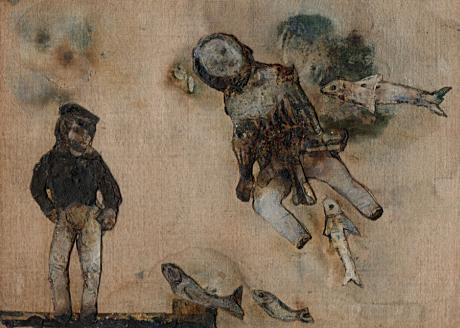
the fish in the water
will move through your head
All Sorts of Remedies
Herbert Pfostl
50 Watts
_______________________
Shadows
Djuna Barnes
(12 June 1892 - 18 June 1982)
A little trellis stood beside my head,
And all the tiny fruitage of its vine
Fashioned a shadowy cover to my bed,
And I was madly drunk on shadow wine!
A lily bell hung sidewise, leaning down,
And gowned me in a robe so light and long;
And so I dreamed, and drank, and slept, and heard
The lily's song.
Lo, for a house, the shadow of the moon;
For golden money, all the daisy rings;
And for my love, the meadow at my side –
Thus tramps are kings!
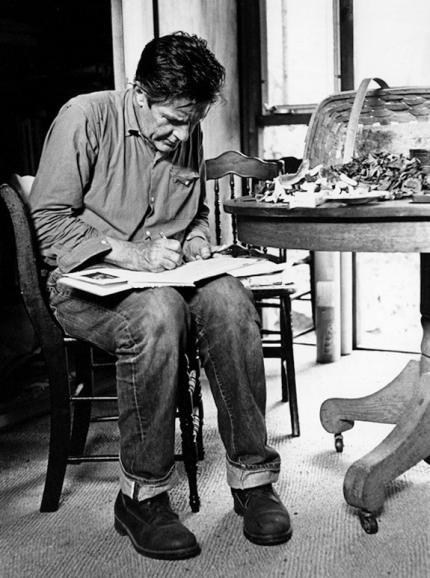
John Cage
with mushrooms
William Gedney
Photographs and Writings
1940s-1989
_______________________
The path is created by walking
Bertold Bernreuter
Translation from the German by Kai Kresse.
polylog: Forum for Intercultural Philosophy 1 (2000).
...the internet provides some means for a new path, breaking with monological decisiveness, a new path to a polyphone vitality eliminating all borders. However, there remain many hurdles which are hard to overcome: poverty, language, oppression; or the hurdles in ourselves. Establishing borders that negate humanity and culture often provokes protest and justifiable civil disobedience.
This is so in times of terror and helplessness in the face of such negations caused by conflicts and wars; in oppression and exploitation; in wrestling intellectually to create paths towards a promising future in our globalizing world; or due to the concrete experiences of otherness, the worry about the self and the search for self-identity, or the quest for historical justice. Intercultural philosophy has many faces and languages; it is pluralistic from the outset. It takes inspiration and encouragement from the multiplicity of discussions in which voices from all over the world find listeners, without being lost in arbitrariness....(more)
_______________________
Making Things Public: Atmospheres of Democracy
Bruno Latour, Peter Weibel (eds.)
(2005)
Monoskop/log
_______________________

Hillsides
Gorman, CA,
Stephen Strom
Florilegium
curated by Struan Gray
Twiglog
_______________________
Two Sequences from Eagle’s Words
a prose-poem in ninety-nine stanzas
Xi Chuan
Translation from Chinese by Lucas Klein
presented by Jerome Rothenberg
On False Causality and True Chance in a Dark Room
31. In a dark room, I turn on the radio. Its melodramatic love story awakens my self-pity. Just then a burglar crawls out from under my bed, engages me in a discussion of the meaning of life, and vows right then to turn over a new leaf.
32. An enthusiast of the Analects of Confucius refutes another enthusiast of the Analects of Confucius to a bloody pulp.
On My Meaningless Life
88. In a crowd of people some people are not people, just as in a flock of eagles some eagles are not eagles; some eagles are forced to wander through alleyways, some people are forced to fly in the sky.
89. I fall asleep as soon as it gets dark, I get up as soon as it’s light out. I always dream of a doctor with a fever and a mail carrier with a toothache, and then I meet them; so in order to meet myself, I must dream of myself, but dreaming of oneself is so embarrassing.
...(more)
_______________________

Poésie de Mots Inconnus
Jacques Villon
d. June 9, 1963
_______________________
RB and me: an education
Brian Dillon
Ruins of the 20th Century
For a long time I sincerely believed I could not love a woman who was not well acquainted with Barthes’s writing. If this seems a bizarre criterion to apply to a prospective lover – all the more eccentric given my dismal prospects to start with – I think I can see now what I was hoping for. Theory in general, and my specific ambitions, had become a way of keeping the world at bay, an intellectual apparatus by which I thought to defuse potentially explosive emotional situations, or more accurately damp the slow-burning grief and general misery that I was unable to express. That much is obvious. What’s perhaps less clear is how much of desire and love and longing I’d also cathected into this stuff by my early twenties. It’s not that I simply wanted a lover who was super-smart and culturally cynical and much better read than I was; I wanted somebody infinitely sensitive and self-scrutinizing, also just as passive and debilitated as I was before the enigma of the Other. And this ideal relationship was obscurely related to central concepts or turns of thought and phrase in Barthes – a kind of abstracted perversity, lurid but nonviolent; a languid refusal of the role of sexual protagonist; a drifting between word and body, sex and Art, ideas and desire. I’d started to read Barthes as if his books, these works of ‘literary theory’, actually described a psychosexual utopia that was just out of reach. (It may be that this is exactly what they do describe.)...(more)
via paperpools
_______________________

tay river
Perth
photo - mw
_______________________
Intuitive Translation and Experimental Writing:
Ashbery and Rimbaud
Katherine Sanders
words without borders
As I read this bilingual edition, the original text and Ashbery’s translation felt like the work of peers. Both authors have been able to push (or ignore altogether) contemporary literary standards, producing work that ranges from the mildly obscure to the nearly incomprehensible. They each managed to destroy poetry while simultaneously redefining it. Ashbery’s task in translating Rimbaud’s Illuminations must have been no less daunting, and the results are certainly no less impressive. He succeeded in being both intuitive and faithful to Rimbaud’s masterpiece....(more)

seawater lido
Kim Hųltermand
via Joerg Colberg
_______________________
The Green Door
Issue 4
Here / Now / Here
Kari Bert / Mira Borghs / Martin Burke / Rodica Draghincescu / Robert Gibbons / Crispin Sartwell / Richard Von Sturmer
plucked from that stream ....
Everywhere
in the thicket of the world
where humans dwell
we hear words dressed as answers
but never the questions
that are alive in us,
but covered with dirt, dust, or cheap humour.
They send the answers to you, printed
or broadcasted in colours,
being themselves colour-blind.
They come to your door and ring,
like yesterday a crumpled up old lady
with enlarged eyes,
asking:” Do you know the answers of life?”
Without thinking I shot back:
“Yes.”
“Sorry,” she murmured,” I didn’t know, you are one of us.”
And disappeared behind the corner of answers,
leaving me in my door
with one more question in my belly.
Poetry could not help me
and in language there were so many black holes
and so many wrong paths
that for all the questions I have,
I had not the wording.
The answers were lumps
of my thinking,
which couldn’t be wriggled. (Kari Bert)
(....)
That’s our nomenclature, that’s how we function in the traipse, through Walden, where I took my students every Spring Equinox. That’s what Kristeva says libido detached from object does to threaten us, so we rap, so we sing, so we, in the old man’s case as young trio with his two brothers, tap on stage, or as I do this raised keyboard. Oh, ya, Spring, Baby, Spring, Baby, Spring! Now don’t get me wrong, it don’t need that swing to have that thing, but best some atonal rhythming thing, you know? You know. So Kiristeva, the greatest writer writing now says that in order to avoid that melancholy with its beautiful last four letters spelling out holy right before artistic-atavistic-uncanny eyes in sublimation needs the resexualizing of words, colors, & sounds. Oh, ain’t it so? I go out, but stay close inside, & when the great tanker Adyagrika appears before my eyes I ask the guy visiting from Pennsylvania with telescopic lens where it’s from, but he says the lens isn’t strong enough wondering what’s wrong with me anyway approaching him as I brazenly brazenly do outside still inside where Kerouac might hear a voice from below, you know that mountaintop below, where all your own words rise up from, good bloody bodily words you won’t let go of but keep to yourself there inside your own bones where Kerouac hears, “Everything is all right forever…,” which last word today I saw graffitied on the ledge thinking whoever spray painted that on the rock face has no notion of forever, how destitute in comparison white paint is to that iron-black ledge, carrying Nietzsche in my coat pocket, pages in which he makes things easy as I rival/oppose my present all-encompassing presence to the inflicted memory of reading Zarathustra at the camp Woodstock, Vermont escape chalet, when the hip dealer challenged such obvious pretention, (another longhair reading Nietzsche, no less), asking abruptly in the crowded room in front of most of the others he knew better than I, didn’t the philosopher madman die of syphilis? Well, yes, but he also wrote… quoting the exact sentence traveling under my inquisitive eyes, shutting him up, but good. Nietzsche now reminds me, again, today, as I come home to a gracious postcard sent from Denmark with an added small black, blank notebook waiting for my own mad pure cured beyond syphlitically cryptic prose to reiterate his secret that, “What is done out of love always happens beyond good & evil.”(Robert Gibbons)
(....)...(more)
_______________________

Campground No. 4
Yosemite National Park
Bruce Davidson
(1966)
.....................................................
A Short History of the Campsite
Martin Hogue
Design Observer
(....)
Modern campgrounds are replete with delightful irony: each "lone" campsite functions as a stage upon which cultural fantasies can be performed in full view of an audience of fellow campers interested in much the same "wilderness" experience. Who in the camping community has not experienced a degree of gear envy at the sight, on a neighboring camp, of a brand new Primus Gravity II EasyFuel stove (with piezo ignition), a Sierra Designs tent, or a Marmot sleeping bag? KOA even leases some permanently parked Airstream trailers, which allow campers to spend the night in a cultural icon; this experiment also allows would-be campers to show up without any personal equipment, just as they would at a roadside motel. No wonder that the daily repetition of chores once associated with survival has now been so fully recast as a series of almost spiritual rituals intended to reconnect the camper with what has been largely lost; for by now most of the old necessities — hiking to and clearing the site, hunting for game, collecting water and firewood — have given way to such less arduous activities as parking the car, pitching cable-free pop tents, buying cold cuts at the campground store, hooking up electrical and sewerage conduits, setting up patio chairs, etc. Serviced by networks of infrastructure and populated with trailers and $100,000 RVs, campgrounds celebrate a unique form of American ingenuity in which intersecting narratives and desires (wilderness, individuality, access, speed, comfort, nostalgia, profit) have become strangely and powerfully hybridized.
To tell the story of the campsite is not to tell the story of any one site or even any one campground, but rather to examine how this cultural ideal of rugged American character came to be appropriated and transformed into a generic and widely replicated template of spatial protocols. It is to talk not only about campers but also about the crucial role of motor vehicles in shaping this narrative, which begins rather innocuously with early 20th-century roadside bivouacs and culminates in today's tightly organized loops of dedicated plots. The following four concepts seem to me key to understanding the radical physical and cultural transformations of the campground in the past century. ...(more)
via Nag on the Lake
_______________________

tuve
Kim Hųltermand
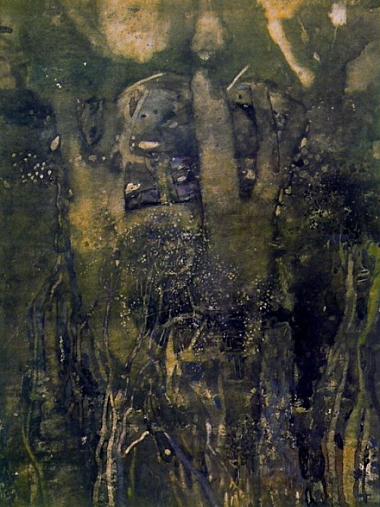
At the Edge of the Wood
Charles Rennie Mackintosh
b. June 7, 1868
_______________________
Agoraphobia as Homesickness
Dylan Trigg
The fear begins as soon as the houses leading to an open area increase their distance from him. ... A feeling of insecurity appears, as if he were no longer walking secure, and he perceives the cobble stones melting together. ... The condition improves by merely approaching houses again.
(Carl Westphal 1871).
Already in Westphal’s original description of agoraphobia, the critical issue is not the objective features of space—openness or closeness—but the relational distance to home. As Westphal’s patient leaves the confines of his zone of safety, so his body opens up to a different way of being. Now, movement is stifled and vertiginousness, the very materiality of the world suffering from a lack of reality. Into this abyssal unreality, open space becomes problematic, not because of the space, as such. But instead, because certain aspects of the environment serve to divide the home from the non-home. Crossing the square—the archetypal agoraphobic motif—the danger is not of the square itself, nor even of the public eyes that descend upon the agoraphobe. To be sure, all of these things contribute to the agoraphobe’s concern, but the kernel of his anxiety is the question of how he finds his way back in the world. The abysmal quality of the agoraphobic world centres on the pathological need to be orientated at all times, where only disorientation and distance are possible....(more)
_______________________
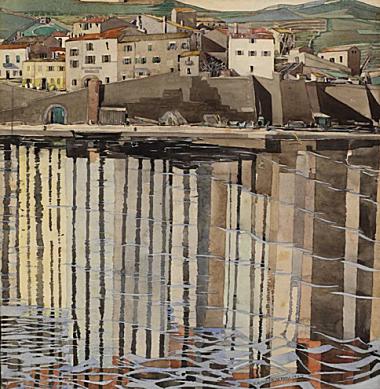 Charles Rennie Mackintosh
_______________________
Corporeal Order
Chris Martin
exquiste corpse
(....)
Fire, itself a tool, allowed us to do two very important immediate things: escape predation and weather. These two forces remained the most crucial in limiting us to an animal existence. Once we were no longer at constant threat, we had time to do something (r)evolutionary: nothing. We had time to sit and stare and let our bigger brains, with their increasing knowledge of manipulation, come up with a fantastic, never before or since paralleled adaptation: imagination. In time, it also became the ultimate tool.
At this exact moment, art was born. The fiction at the beginning of fiction. The image, most commonly celebrated in the cave paintings of France, became an abstracted representation of the world. What might seem like a fairly benign beginning can actually be seen as a sort of Pandora’s box. Again, beware the dubious, destructive usefulness of the image! Just like the mirror with its misrecognition, displacement, and construction of the self, the abstracted image of representation allowed for a misrecognition, displacement, and construction of the world. This second world, a representational world, is the world of the spectacle. It is an ordered world, resolutely hierarchical, where knowledge of ontological truth is made inaccessible and beyond utility. If we want to approach anything resembling truth, we must acknowledge that life is built not on abstract stability, but on lived disequilibrium.
If it isn’t clear already, I am writing with a particular agenda. I want to disprove the notion that each is alone, separate, one isolato after another. But let’s not couch this in negative terms. To negate separation is also to affirm the multiplicity that each body is, or in Deleuzian/Spinozian terms, does. We must attend to the manner in which bodies mingle with, coincide with, interpenetrate, and most importantly compose one another. This involves a departure from the reasonableness of abstraction, a divergence from the symbolism of spectacularity. It is a movement that perpetually returns us to the middle where we have always been. It is an abolishment, perhaps only temporarily, of the displacement of the body. Ontologically, it is a recognition of placement. ...(more)
_______________________

rails and wire
photo - mw
_______________________
From The Kaleidoscopic Almanac and Seed Catalogue, with Notes
Chris Hosea
conjunctions
1.
Born to be. Under amplified sermons cliffs erode. All this they wrote out and folded before leaving. Out at collar, they arrive bringing collars. To collar. If I knew who they were, I would let on. Give forth. Sunrooms awaken the home. Summer afternoons grant a lemony pucker we share evenings. Care, careless one. We do care and they do. Paradox nurses workers. Then the others they were. Clean tools, sharp now, in orderly files. All this sad on ice, when in a cooler. Unopened, Hank lies sober. Uneasy to read his flat lip, or just leave it. Forever and now. See a snake pass across the trail. Trace mottoes scratched in clay. Inky. A bright gang here. Freedom lights fuses. These my embarrassed words, embroidered. Fly outward, menacing satellites so fragile. A strong headwind awakes your familiar, the tattooed actor. What washes and rusts in the ocean, you ask him, livid with unspent blame. Anger drips on the barbecue. Meaning beefs. Calm as cows, you are so skittish with strangers, all right, okay mystery. To own up to livestock. Your generation born in wards.
...(more)
_______________________
A theatre of pure stichomythia: Twitter and the tragic
Seamus Sweeney
nth position
(....)Who knows where Twitter will lead us (or where we will lead it) but we would all do well to recall Charles Péguy’s words: “Humanity will surpass the first dirigibles as it has surpassed the first locomotives. It will surpass M Santos-Dumont as it has surpassed Stephenson. After telephotography it will continually invent graphies and scopes and phones, all of which will be tele and one will be able to go around the earth in less than no time. But it will always be only the temporal earth. And it will even be possible to burrow inside the earth and pierce it through as I do this ball of clay. But it will always be the carnal earth.” M. Santos-Dumont was an aeronaut, as aviators were known – now we see something thrillingly old-fashioned and romantic about the pioneers of aviation and motorsport, dashing figures as remote from us as Julius Caesar or Charlemange, and yet in their time they were the icons of hyper-modernity. They were the Sergey Brins and Mark Zuckerbergs of their day.
All of this, aside from being a chance to air some of my favourite quotes, is leading up to a point. Can everything be expressed in 140 characters or fewer? Of course, the hashtag and the hyperlink allow communications that transcend this barrier, and help provide Twitter with some of its hypnotic power. It is the internet condensed into a single website. However, the essence of twitter is brevity. I alternate between revulsion and fascination, between periods of Twitter celibacy and promiscuity. This ambivalence reflects a tension between sheer wonder at the breadth of information available online, and fears about its depth. More to the point, do we run the risk of a mass attention deficit disorder, unwilling to engage with anything more than the fabled one hundred and forty?...(more)
_______________________
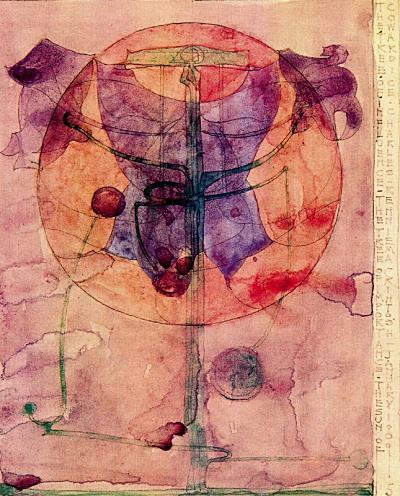
The Tree of Influence
Charles Rennie Mackintosh

St. Lawrence River
photo - mw
_______________________
Island Storm
Edwin Honig
All morning in the woods I heard the bushes choke
Among dead boughs that creaked and groaned,
And no other murmur than the flurry of live prey
Grappling in the wind's slow teeth.
A starling toppled near the river-run, black
as stone. A garter snake shivered
Up a root and instantIy turned brown. It began
On such a day prophets used
To rave about - "Stiff-necked mankind, remember
Sodom and God's frown!" Through miles
Of tensing acreage only two eyes peeped when it
Came down. The road became a falls
Where hubbubs fell to foam across a glazed surrendering
Of channeIled stone. In the hollow beat
Of some annihilating warmth, tumorous old stumps
Were ground to muck. "Will it be day
Again?" I heard the brittle windows ask the lightning
Flash, and tremble three full hours
As it spoke. Often, while the sea coughed distantly,
Infamous last words of misanthropes
Ransacked my brain for counter-prayers. Below the eaves,
Crackling like a greasy fiying
Pan, only a floral lampshade quavered hope.
When at last the silence trickled in, l found
The fungi like great plastered wounds,
The stupifying sweetness everywhere. And when
The weather turned gigantically
And padded off, I found the world it left nearby:
On the bloated attic floor,
Two drowned mice; through the skylight, one fir
Permanently bowed; above the flooded
Garden, the first fierce dart of an exploratoiy crow.

Edwin Honig
1919 - 2011
Edwin Honig — eight poems
jacket 16
The Poet's Other Voice: Conversations On Literary Translation
Edwin Honig
google books
Willard Trask; John Hollander; Herbert Mason; Ben Belitt; Richard Wilbur; Robert Fitzgerald; Max Hayward; Edmund Keeley; Octavio Paz; Michael Hamburger; and Christopher Middleton.
Poems of Fernando Pessoa
translated and edited by Edwin Honig and Susan M. Brown google books
_______________________
Mushrooms and Literature
Justin E. H. Smith
(....)I've always found plants boring and have not managed to learn the names of more than a handful of them. I raced through Aristotle's five books on animals, but could not bring myself to read his disciple Theophrastus's Enquiry into Plants or On the Causes of Plants, which were supposed to complete the Aristotelian project of investigating the living world. Animals jump out at me, sometimes literally; they are phenomenally salient, as the cognitive scientists say, whereas plants just fade into the background.
We might suppose it shows Nabokov's great subtlety of mind that he picked them out for attention anyway (though we should follow up with the point that his greatest interest among living beings was for that most sensationally salient of creatures, the butterfly). Still, the advice is excellent, perhaps the best ever given in the history of literary instruction. Nabokov's novels themselves (especially Ada) are vividly botanico-entomological, or, better, they are showcases for a sort of phyto-entomonymical mastery. Nabokov understood how to draw essences out of names; he understood that what makes literature live is precisely the theory of nomenclature, the philosophy of language, that had to be repudiated with the rise of modern science, one of the great achievements of which was the arbitrary naming scheme of the System of Nature of 1735.
I used to care only about animals, and then I noticed fungus. ...(more)
_______________________
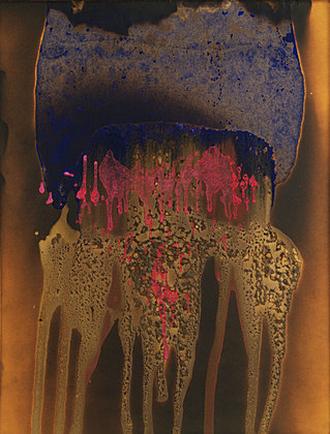
Yves Klein
d. June 5, 1962 Yves Klein
_______________________
American Nightmare:
Neoliberalism, Neoconservatism, and De-Democratization
Wendy Brown
Political Theory 2006; 34; 690
mediafire pdf
... If, as I have suggested elsewhere, the institutions as well as the political culture comprising liberal democracy are passing into history, the left is faced both with the project of mourning what it never wholly loved and with the task of dramatically resetting its critique and vision in terms of the historical supersession of liberal democracy, and not only of failed socialist experiments.
This essay does not pursue these projects of mourning or revisioning: rather, it frames their necessity by exploring the forces of de-democratization produced at the intersection of neoliberal and neoconservative rationalities in the United States. What are some of the accidental symbiotic effects of the convergences between these two rationalities, effects that not only hijack the meaning of democracy to sanction permanent and extreme class divisions, managed and bought political life, power concentrated in links between corporate and governing elites, and imperial statism, but also destroy the foundation of democracy in the cultivation of a people’s needs, desires, and orientation toward power and powerlessness? And what elements of left protest against these rationalities might reiterate these effects? _______________________

late light
lilac and honeysuckle
photo - mw
_______________________
Blanchot Romantique: A Collection of Essays
John McKeane and Hannes Opelz, ed.
reviewed by Kevin Hart
(....)
This collection of essays is one such volume. Blanchot Romantique tackles the large and multi-faceted questions of Blanchot’s debts to Romanticism, his displacements of Romantic motifs in his criticism, narratives, and fragmentary writing, and his re-launching of Romantic or Post-Romantic gestures from new positions in his later political writings.
(....)
Perhaps the anguish and frustration, the fascination and lightness, of the “experience” that Blanchot evokes here and in so many other places testifies to something that for him replaces the sacred, or is the truth of what people once took to be the sacred, a truth that might reverse much of what the Romantics understood the sacred to be. Regardless of all that, the “experience” calls to be read in terms that phenomenology has made available, and continues to explore with finer and finer discriminations. Blanchot Phénoménologique anyone?...(more)

Plantanus occidentalis
Buttonwood
planted 1897
Ottawa
photo - mw
_______________________
notes on poetry and dissent
Richard Hoffman
(....)A Knocker
Zbigniew Herbert
translated by Czeslaw Milosz and Peter Dale Scott
There are those who grow
gardens in their heads
paths lead from their hair
to sunny and white cities
it’s easy for them to write
they close their eyes
immediately schools of images
stream down from their foreheads
my imagination
is a piece of board
my sole instrument
is a wooden stick
I strike the board
it answers me
yes—yes
no—no
for others the green bell of a tree
the blue bell of water
I have a knocker
from unprotected gardens
I thump on the board
and it prompts me
with the moralist’s dry poem
yes—yes
no—no
Maybe in another time, a time when the world had not been poisoned by a century of genocides and mechanized murder, and before the continuing threat of ecocide, a poet could trust his or her culture’s assumptions about what it means to be good, or powerful, or heroic, or simply human. We do not live in a time like that. ...(more)
_______________________
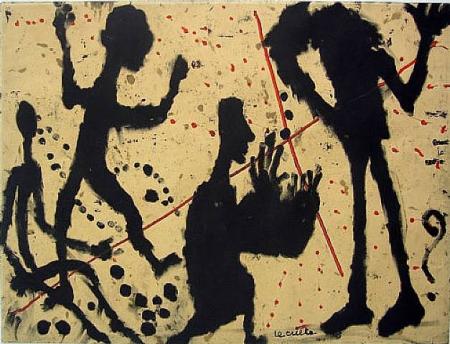
Le culte
Louis Soutter
b. June 4, 1871
_______________________
The End of Thinking
Giorgio Agamben
mediafire pdf
(....)Thinking: we can think only if language is not our voice, only if we fathom the bottom ofourvoicelessness. But in truth, there'sno bottom. Such an abyss is what we call the world.
Logic shows that language is not my voice. It says moreover that the voice, though it has been, is no longer, nor can it ever be. Language takes place in the non-place of the voice. Which means that, concerning the voice, thinking has nothing to say. This we may call its piety.
So then the fleeing, the pending of the voice in language must come to an end. We can finally stop holding language, and the voice, in a suspended state. If the voice has never been, if thinking is the thinking of the voice, then it has nothing to think about A thought which is fulfilled, in other words, has no thoughts left to think.
(....)
_______________________
City That Does Not Sleep
Federico Garcķa Lorca
(June 5, 1898 - August 19, 1936)
Translated by Robert Bly
(....)
Nobody is sleeping in the sky. Nobody, nobody.
Nobody is sleeping.
If someone does close his eyes,
a whip, boys, a whip!
Let there be a landscape of open eyes
and bitter wounds on fire.
No one is sleeping in this world. No one, no one.
I have said it before.
No one is sleeping.
But if someone grows too much moss on his temples during the
night,
open the stage trapdoors so he can see in the moonlight
the lying goblets, and the poison, and the skull of the theaters.
...(more)
_______________________

Ottawa River
photo - mw
_______________________
Available Light: Anthropological Reflections on Philosophical Topics
Clifford Geertz
mediafire pdf
_______________________
Infinite exchange: The social ontology of the photographic image
Peter Osborne
What does it mean to speak of photography from the standpoint of philosophy? The difficulty derives as much from the idea of a unitary philosophical standpoint – however abstract – as it does from the rapidly changing nature of the photographic, which now famously threatens any discourse about photographic ontology. Philosophy is riven from within by disagreements about its purported disciplinary autonomy, status and form, and hence its standpoint in relation to other fields of enquiry. It is split, in particular, by disagreements about the legitimacy of philosophizing beyond, even against, philosophy itself; and these disagreements are necessarily reflected in different ways of philosophizing about ‘photography’.
Suffice to say, in the 200-year dispute between those who attempt to separate out philosophy as the critical self-consciousness of reason from the experience of objects, and those who would conjoin them in the notion of the construction of a critical experience of objects, I side with the latter. To speak about photography from the standpoint of philosophy, from this point of view, it is also necessary to speak about philosophy from the standpoint of photography. That is to say, one cannot subtract the historical character of the image from the image of thought. At one time, it was considered useful to oppose the photographic image of thought of a reified Cartesian consciousness (by which objects are ‘frozen’ into things in order to be made ‘available to science and practice as things for others’) to the filmic image of a dialectical thought (in which the details of individual moments of an object are subjugated to the rhythm of the movement of thinking) – Adorno described Hegel’s dialectics as ‘films of thought’. Yet today, with digital technologies of image production, this distinction is itself outmoded. The attempt to rethink the nature of the photographic image, postdigitalization, has consequences for the reimaging of thought and hence for philosophy itself. It is also bound up with the concept of art, in its generic, post-medium form. In what follows, I approach the concept of photography and the notion of the photographic image at once historically, philosophically and via their relations to the concept of art.
(....)
Philosophy of Photography
Volume 1 Issue 1
March 2010
Philosophizing photography/ photographing philosophy
In summer 2009 the editors invited a number of prominent thinkers known for their writing about photography to contribute a short text to this symposium on the present conjunction of photography and philosophy. The resulting collection of eight essays inaugurates this journal and provides a tentative agenda for future contributions by outlining a range of themes, processes, methodologies and digressions that might be explored in greater depth, and from different perspectives, in future issues of the journal.
via Gary Sauer-Thompson

Mikhail Larionov
b. June 3, 1881
_______________________
We Rise On Sun Beams And Fall In The Night
Dawn's orb orange-raw shining over Palisades
bare crowded branches bush up from marshes--
New Jersey with my father riding automobile
highway to Newark Airport--Empire State's
spire, horned buildingtops, Manhattan
rising as in W. C. Williams' eyes between wire trestles--
trucks sixwheeled steady rolling overpass
beside New York--I am here
tiny under sun rising in vast white sky,
staring thru skeleton new buildings,
with pen in hand awake ...
-
Allen Ginsberg
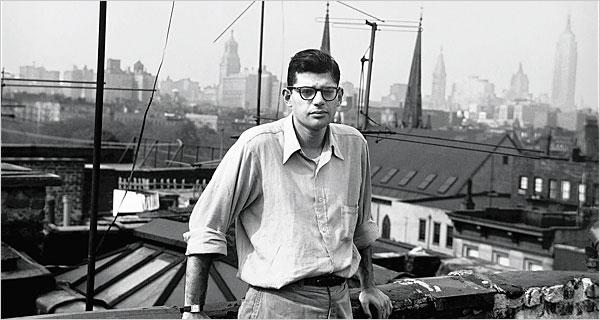
Allen Ginsberg
b. June 3, 1926
photo by William S. Burroughs ,1953
_______________________
Language And Place On The Edge
Edition 6 of the >Language >Place blog carnival
hosted by Michelle Elvy at Glow Worm
via tasting rhubarb
.....................................................
Out of whack and out of step
A reflection on translations and synonyms
Dorothee Lang
"For there is only one great adventure and that is inward toward the self, and for that, time nor space nor even deeds matter" - it was this pick-up line of Henry Miller that made me fall for his novel "Tropic of Capricorn" in one single sentence after I returned from my first trip to India.
I had borrowed the German version of Miller's book in the library in my hometown, but thought twice about it in the middle of the second chapter and ordered the English version, which was the right decision. It's not that the German translation was not worthwhile, it's just that the original version is so much more of the real thing, it has a different flow, a different breathing.
Like this sentence for example: "at least I knew that I was unhappy, unwealthy, out of whack and out of step" is what Miller had written, a line that still could be written today, eventually even could be rapped from a stage. What unfortunately can't be said for the germanised line: "ich wusste wenigstens dass ich ungluecklich und arm war und nicht aus der Reihe tanzte." The line rather sounds like a bleak cover version performed by someone who had never been on those ragged roads himself, and translates back into: "at least I knew that I was unhappy and poor and did not step out of the line."...(more)
_______________________

The Sea at Etretat
Johan Barthold Jongkind
b. June 3, 1819
_______________________
from Mambos Religiosos
Max Lichtenstein
translated from the Spanish by Cordelia Brodsky
The Stairway Doesn't Go to Heaven
The pamphlet's promised gold never arrives One has to
lie in the paper to find the perfect lover Did you believe
that beer? We might not all make it together
That scares me Let's not all think together It scares
me more I swim in self deception And surf cheap tricks
to not muddle further... That miracle is never going
to happen and that is the worst sin of a miracle.
...(more)
Asymptote a new international journal dedicated to literary translation and bringing together in one place the best in contemporary writing including: fiction, poetry, drama, visual poetry, criticism, essays and interviews.
_______________________

Raoul Dufy
_______________________
In a frequently cited portion of Simulacra and Simulation (1981), Baudrillard refers to the Old Testament book of Ecclesiastes: "The simulacrum is never that which conceals the truth--it is the truth which conceals that there is none. The simulacrum is true." Neither the word "simulacrum" in any variation, or the word "truth," appears in Ecclesiastes. The book is considered a book of wisdom similar to Proverbs, to which Baudrillard simply adds. But it is in this gesture that we find the key to understanding Baudrillard. The phrase is ambiguous, that truth conceals that there is no truth, or by another reading, that there is no copy. This duplicity of truth and its image is the paradoxical unity of reality and illusion. The two are for Baudrillard insuperable and together are the basis of "Radical Thought," his 1995 text for CTheory.
-
Rachel K. Ward
Being -- Thinking -- Writing Jean Baudrillard
Rachel K. Ward and Jeremy Fernando
a dual response to Jean Baudrillard's text "Radical Thought
ctheory
_______________________
Wichita Vortex Sutra II (excerpt)
Allen Ginsberg
Three five zero zero is numerals
Headline language poetry, nine decades after Democratic Vistas
and the Prophecy of the Good Gray Poet
Our nation "of the fabled damned"
or else . . .
Language, language
Ezra Pound the Chinese Written Character for truth
defined as man standing by his word
Word picture: forked creature
Man
standing by a box, birds flying out
representing mouth speech
Ham Steak please waitress, in the warm café.
Different from a bad guess.
The war is language,
language abused
for Advertisement,
language used
like magic for power on the planet:
Black Magic language,
formulas for reality-
Communism is a 9 letter word
used by inferior magicians with
the wrong alchemical formula for transforming earth into gold
-funky warlocks operating on guesswork,
handmedown mandrake terminology
that never worked in 1956
for gray-domed Dulles,
brooding over at State,
that never worked for Ike who knelt to take
the magic wafer in his mouth
from Dulles' hand
inside the church in Washington:
Communion of bum magicians
congress of failures from Kansas & Missouri
working with the wrong equations
Sorcerer's Apprentices who lost control
of the simplest broomstick in the world:
Language
O longhaired magician come home take care of your dumb helper
before the radiation deluge floods your livingroom,
your magic errandboy's
just made a bad guess again
that's lasted a whole decade.
...(more)
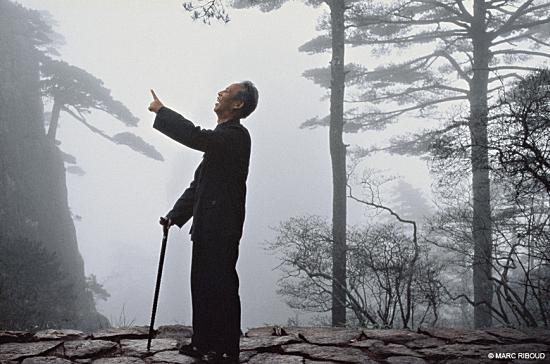
Huang Shan
Marc Riboud
1985
_______________________
The Unlived Life is not Worth Examining
Alphonso Lingis
ifile pdf
How strange that a human, a living organism, is conceived as a material system in which needs and wants agitate it to open its eyes to the outside and seize the contents that satisfy its appetites and leave it to close back upon itself in contentment. How strange that life is conceived negatively, that the spirit is conceived as negativity.
A guppy, a cockatoo, a monkey, a human are organisms that continually generate excess energies that are discharged without thought or need of recompense. These superabundant energies are not simply dissipated; emotions that isolate, frame, crop, color, and shade events of the environment give them direction. Emotions, which dramatize, are the strength of vital movements; the primary emotions are active and thrust an organism into the thick of things.
How strange that emotions are conceived as reactions to things perceived, identified, and evaluated. Emotions break through the packaging and labeling of things that make our environment something only scanned and skimmed over. They are the forces that seek out and engage reality. Emotions are the forces with which we discover nature that summons in what we perused as the text of the universe.
_______________________
The Flight of Curiosity
Justin E. H. Smith
... among the great many truths in the world is this one: a man named Digby once believed something false. To take an interest in that false belief is not to reject the truth, but only to wish to fill out our picture of the truth with as much detail as possible, and not because of some aesthetic inclination to the baroque, but rather because false theories are an important part of the puzzle that we as philosophers should be trying to complete: that of determining the range of ways people conceptualize the world around them....(more)
_______________________

Environs de Chartres
Marc Riboud
1953
_______________________
Interview with Wendy Brown
Broken Power Lines
... you have argued that neoliberalism does not simply promote economic policies but to quote you “disseminates market values into every sphere of human activity.” What distinguishes your perspective here from the despair found in someone like Adorno? What would it require to translate the despair that many people experience in very personal and de-politicized ways into a form of political mobilization?
Wendy Brown: That is an interesting question because it assumes that neoliberalism produces despair. I wish it did but I am not convinced that it does. I think that the process that some of us have called neoliberalization actually seizes on something that is just a little to one side of despair that I might call something like a quotidian nihilism. By quotidian, I mean it is a nihilism that is not lived as despair; it is a nihilism that is not lived as an occasion for deep anxiety or misery about the vanishing of meaning from the human world. Instead, what neoliberalism is able to seize upon is the extent to which human beings experience a kind of directionlessness and pointlessness to life that neoliberalism in an odd way provides. It tells you what you should do: you should understand yourself as a spec of human capital, which needs to appreciate its own value by making proper choices and investing in proper things. Those things can range from choice of a mate, to choice of an educational institution, to choice of a job, to choice of actual monetary investments – but neoliberalism without providing meaning provides direction. In a sad way it is seizing upon a certain directionlessness and meaninglessness in late modernity. Again, I am talking mainly about the Euro-Atlantic world: without providing meaning, it provides direction. So I think it is quite a different order of things from the one that Adorno was describing....(more)
_______________________
Ballad of the Poverties"
Adrienne Rich
from Adrienne Rich's recent book Tonight No Poetry Will Serve
courtesy of Philip Metres
(....)
There’s the poverty of wages wired for the funeral you
Can’t get to the poverty of the salary cut
There’s the poverty of human labor offered silently on the curb
The poverty of the no-contact prison visit
There’s the poverty of yard sale scrapings spread
And rejected the poverty of eviction, wedding bed out on street
Prince let me tell you who will never learn through words
There are poverties and there are poverties
You who travel by private jet like a housefly
Buzzing with the other flies of plundered poverties
Princes and courtiers who will never learn through words
Here’s a mirror you can look into: take it: it’s yours.
...(more)
_______________________
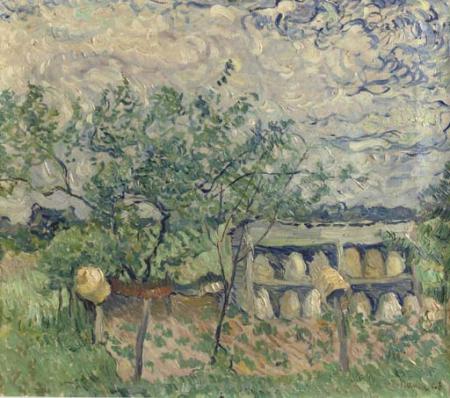
Beehives in the garden
Heinrich Nauen
b. June 1, 1880
_______________________
Through the Looking Glass, and What the Author Saw after Being Translated
Lścia Bettencourt
words without borders
(....)
I’m not a native speaker of English, but I read and even write in the language with some fluency. I’m a friend of my translator; I trust her completely; I’ve had the opportunity to review and comment on the texts she’s put together. But then there’s the tale of the translation of “Borges’s Secretary” into Arabic. When this story of mine, translated by Kim Hastings, was published by Words Without Borders, an Egyptian reader, living in Yemen, sent me an e-mail (in English) telling me he’d been so taken by the story that he’d translated the piece into Arabic, and was asking permission to run it in the newspaper where he worked. I replied that I’d love to see the translation; I was counting on showing it to an Egyptian friend so she could read it and tell me what she thought. The translator, meanwhile, took this to be my authorization and sent me a message saying that the story had been published. I realized then that, once written, one’s work becomes a kind of mirror, but the image that mirror reflects is never of the author. It’s the kind of mirror Machado de Assis and Guimarćes Rosa created, which reveals unsuspected truths. There’s always a difference. My image is necessarily inverted, transformed. Re-created. And if I search for what’s behind the glass where I think I see myself, I find the opaqueness of the metal. I’ve also come to realize that I can’t comment or offer suggestions on translations that other people perhaps interested in my work might one day undertake. I might not know the language, or the person doing the translation—or I may already be dead. I’ve also come to appreciate the opinion of Walter Benjamin, who regarded translation as something beyond the work. A meta-work. Something that transcends (the) simple creation, takes it up a notch, and makes translation a sophisticated intellectual exercise, simultaneously creation and philosophy, since it’s closer to what may be the essence of language.
...(more)
on Translating "Borges's Secretary" Kim M. Hastings
Borges's Secretary
Lścia Bettencourt
Translated from Portuguese by Kim M. Hastings
_______________________
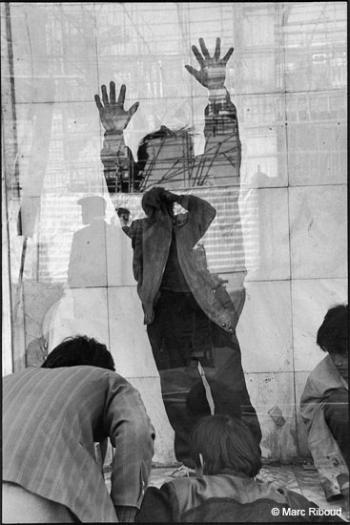
Environs de Shanghaļ
Marc Riboud
1995
_______________________
"Authentic texts"
Translation is trade without commerce
Jen Hofer
jacket2
Displacement. Chosen and unchosen migrations. Free and unfree trades. How displacement is also a kind of placement, an unfamiliar vantage point from which to renegotiate terms, terrains, parameters, possibilities. Translation is willing and willful displacement. In moving a word, phrase, line, sentence, stanza, paragraph, idea, framework from the space of one language to the space of another, something utterly transformed is created, and something that is still very deeply (though not essentially) the same as what it was to begin with (which was not immobile in the first place).
Alchemy
In a conversation, Sesshu Foster recently referred to the space of translation as “no-man’s land.” I’d agree and also add the idea of “every person’s land,” in the sense that no one and everyone might belong there, or perhaps that the very concept of “belonging” no longer pertains—the question is one of moving through space, rather than claiming it. Of using the terms imposed upon us (as Adriįn Esparza uses the typical Mexican blanket sold to tourists, for example) to subvert the intentions of their imposition. To unknit the weave that would bind us....(more)
_______________________
Our Congregation of the World Weary
Casey Thayer
translates the world one way as a close shave
with teenage pregnancy. It translates as a car-
bomb, as cat litter that clumps for quick clean-up.
Why are we on the list of every chain letter?
Why does this itch? Why are you the walrus?
The world translates as a crude pictograph
scrawled in ink on the arm of our waitress.
We too have mapped the body and want a word
with the architect. ....
...(more)
Devil's Lake - Spring 2011
via riley dog
_______________________

Heinrich Nauen
1904
_______________________
A Governing Uselessness
John Latta
Isola di Rifiuti
(....)
Basil Bunting ... begins by refusing to cotton to the usual high-principled truck of Eliot and Pound who “used to maintain that poetry was a useful art, even a necessary one”:
The poet’s business was to purify the dialect of the tribe, or clarify it, or otherwise keep words clean and sharp, so that men, who mostly think in words, could have thoughts with sharp edges.
Bunting right off concludes “they were muddled” and counters by noting how “fruitful thought seems to be very rarely precise,” connecting such precision “with barren logic”—habitually the domain of “clerks and accountants.” (I think of Robert Morgan insisting that poetry is mathematic at its core: just a Poindexter’s way to beleaguer and limit the manifold usufructuary of the lingo, and all its perfervid rampancy, is what I retort’d, though probably in somewhat different words . . .) Bunting, bluntly: “Poetry is no use whatever. The whole notion of usefulness is irrelevant to what are called the fine arts, as it is to many other things, perhaps to most of the things that really matter.” ...(more)
|

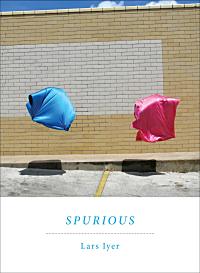


 The Age of Briggs & Stratton
The Age of Briggs & Stratton






































